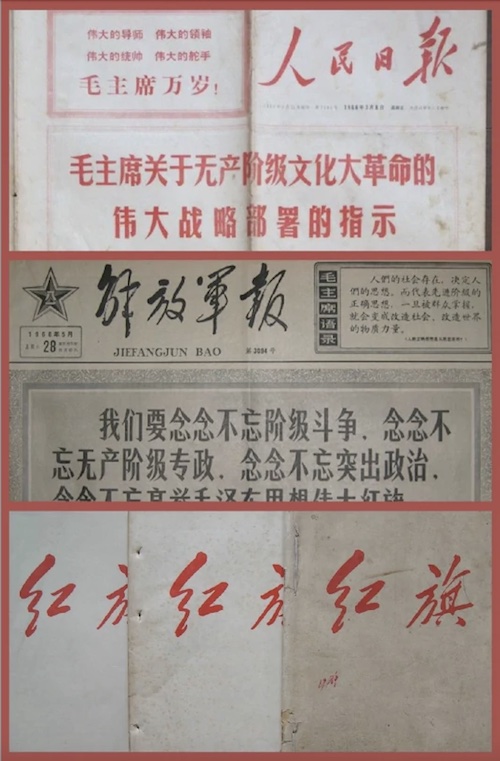THE CMP DICTIONARY
Politicians Run the Newspapers
Politicians Run the Newspapers
“Politicians run the newspapers” is a concept first raised by Mao Zedong in 1957, in the midst of the Anti-Rightist Movement that followed the Hundred Flowers Campaign, which had ushered in a brief period of enthusiastic and sometimes daring journalistic expression that Mao regarded as personally threatening. “The writing of articles, and especially lead editorials (社论), must be responsible to the overall interests of the party, united closely with the political situation,” he said. “This is what is meant by politicians running the newspapers.”
In 1959, Mao wrote again: “In doing news work, we must have politicians running the newspapers.”

The Mao-era concept of “politicians running the newspapers” was best epitomized during the Cultural Revolution as Mao’s editorials came to dominate papers across the country under what came to be called the “two newspapers and one journal” (两报一刊) system.
The concept was not strongly emphasized in the 1980s, as the spirit of economic, and even political, reform gripped the country. The over-concentration of influence by Mao and the Gang of Four over the media from the late 1950s through the 1970s was regarded during this time as having contributed to the disastrous and deadly politics of the Cultural Revolution, and there was a push to transform the role of the media.
“Politicians run the newspapers” emerged again in the 1990s under Jiang Zemin, who had introduced the idea of “correct guidance of public opinion” in the wake of the Tiananmen Massacre that brought him to power. Even as Chinese media were undoing a radical commercial transformation, Jiang re-emphasized Mao’s original concept as a bottom line in news and public opinion work. During a visit to the Liberation Army Daily on January 2, 1996, Jiang Zemin said: “Mao Zedong once said that in doing media work we must ensure that the papers are run by politicians. This warning rings true even today.”
Under the leadership of Xi Jinping the concept of “politicians running the newspapers” has again flourished.
Terms of a similar vein from the late 1990s and early 2000s included “politicians running the websites,” which came into use particularly in 1999, as the government’s campaign against the Falun Gong religious sect became a political obsession.
Under the leadership of Xi Jinping, who has generally followed a much more hardline approach to the media than his predecessors in the reform era, the concept of “politicians running the newspapers” has again flourished. Xi mentioned the term more prominently in his February 2016 speech on media policy, delivered as he paid an official visit to the offices of the People’s Daily and stressed the idea also that media “must be surnamed Party” (必须姓党). “News and opinion workers must enhance their awareness of [the concept of] politicians running the newspaper,” said Xi Jinping.
Many official news outlets today, including the People’s Daily, emphasize the concept of “politicians run the newspapers” in their public descriptions of their identity and work. As Chinese media issued their annual “social responsibility reports” (社会责任报告) in 2023 under a system implemented 10 years earlier, all routinely mentioned “politicians running the newspaper” as a core concept in their operations [See Xinhua, and Nanfang Daily].

David Bandurski
The CMP Dictionary
C
D
F
G
M
N
P
S
- Scaling the Wall
- Science
- Second-Generation Reds
- Security
- Seeking Progress in Stability
- Seeking Truth From Facts
- Self-Revolution
- Seven Bottom Lines
- Six Adheres
- Smart Governance
- Sneaky Visit
- So-Called
- Socialite
- Soft Resistance
- Soul and Root
- Soundless Saturation / Quietly Nourishing
- Sovereignty
- Speaking Politics
- Streamlining Services
- Strong Cyber Power